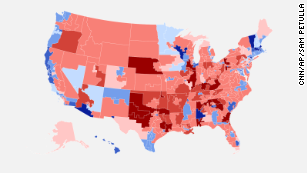SIREN: The Democratic wave looks like it is getting bigger

MAGIC WALL: What GOP departures mean for 2018 01:59
(CNN)On Tuesday night, it happened again.
Democrat Patty Schachtner beat Republican Adam Jarchow for a western Wisconsin state Senate seat that had been held by a Republican since 2000 and in a district that President Donald Trump won handily in 2016.
Schachtner's
win marked the first Republican-to-Democrat switch at the state
legislative level of 2018 but it is the 34th state legislative seat
pickup for Democrats since the start of 2017. That trend is beginning to
rightly alarm smart Republicans.
"Senate District 10 special election win by a Democrat is a wake up call for Republicans in Wisconsin," tweeted Wisconsin Republican Gov. Scott Walker soon after the race was called on Tuesday.
It's
not just Wisconsin. In Virginia, Democrats flipped 15 Republican seats
in the November 2017 election. A 16th seat ended tied but Republicans retained control after their candidate won a drawing of lots.
In Oklahoma -- not exactly a Democratic-friendly state -- Democrats
nonetheless picked up three GOP-held state legislative seats last year.
In New Hampshire, two GOP seats flipped in September.
It's
not just about state legislative seats. In Virginia, Gov. Ralph
Northam, a Democrat, won by a larger-than-expected margin thanks to
sky-high Democratic turnout. In Alabama, Doug Jones became the first
Democrat to win a Senate seat in the state since 1992 -- buoyed by
massive African-American turnout.
The
writing is on the wall. The Democratic base is hugely excited --
largely due to their distaste for Trump. The Republican base -- at least for most of 2017
-- has been less passionate. And that sort of base enthusiasm disparity
has translated -- and likely will continue to translate -- into major
gains for Democrats in the midterms.
History
suggests that Republicans are in a familiar position: Standing in the
shallow water watching a massive wave building out in the ocean. According to Gallup,
the average seat loss for the president's party in midterm elections
with a president under 50% approval (as Trump is now) is 36 -- a number
that, if past predicted present, would cost Republicans their House
majority.
The generic ballot --
"if the election were held today, would you vote for a Democrat or a
Republican for Congress" -- looks no better for Republicans. Democrats
currently have an 11-point generic edge, according to Real Clear Politics polling average. At
this time in the 2014 election, a very good election for Republicans,
Democrats had a nearly 2 point edge on the generic ballot. In 2006, the
midterm election where Democrats won back control of Congress, the
party's generic ballot edge was only 10 points.
There are caveats, for sure.
Republicans grew their numbers massively at the state legislative level during the Obama presidency -- picking up more than 900 seats across the country.
That means that there is considerable fat to trim from Republican ranks
before you come anywhere close to cutting to the bone.
And, Republicans aren't losing every race at the state legislative level. On Tuesday, for example, they held onto a Republican western Iowa seat in a special election.
(Democrats note that Trump won 62% of the vote in the seat and
Republicans spent more than $100,000 to hold a seat that was already
theirs.)
But, a broad look at the
election results of the past year suggests one thing very clearly:
Republicans are headed for a major reckoning from voters this fall.
That reality appears to be sinking in.
Already
33 Republican House members have announced they will either retire or
run for some other office in 2018 as compared to just 15 Democrats. Of
those 33 Republican retirements, a number hail from seats Hillary
Clinton won in 2016 or where Trump's margin was small -- meaning that
the open seats they leave behind are major pickup opportunities for
Democrats.
In the Senate, a number of top-tier Republican recruits -- former Minnesota Gov. Tim Pawlenty, most recently -- have decided against running of late, announcements in which the rough political environment absolutely played a role.
The
thing about waves is they build on themselves. Big ones get bigger as
they approach the shallower shore. That looks to be what's happening
with each passing week. And, while the 2018 election might feel very
far off, we are now under 300 days until November 6, 2018. It may well
already be too late for Republicans.



No comments:
Post a Comment